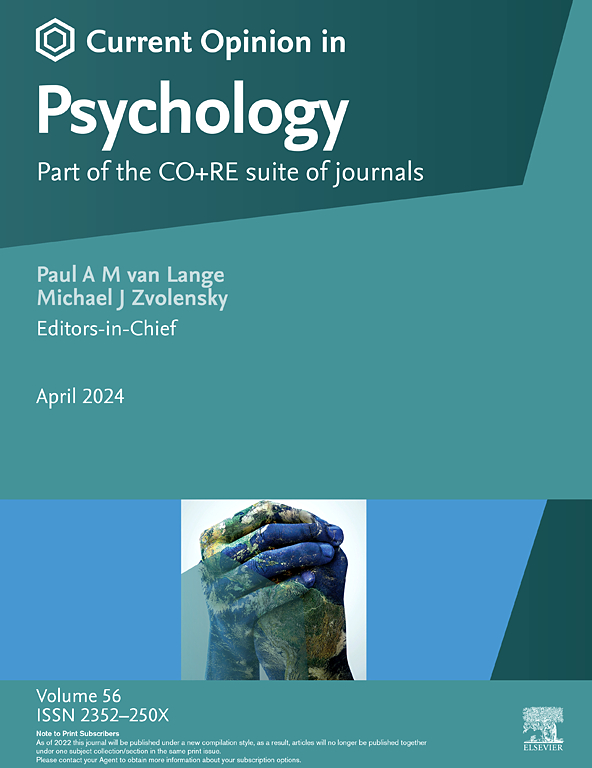Understanding and promoting nature connectedness: A human ecological perspective
IF 6.3
2区 心理学
Q1 PSYCHOLOGY, MULTIDISCIPLINARY
引用次数: 0
Abstract
People's subjective sense of their relationship with nature – or nature connectedness – is consistently found to relate to both well-being and pro-environmental values and behaviors. Yet human perceptions of their relationships with the rest of nature are complex and, in many cases, reflect cultural beliefs and historical legacies. In this paper we identify a tension within the research literature on nature connectedness and associated efforts to understand, measure, and promote nature connectedness. The tension is between what we describe as (1.) human exceptionalist perspectives, which envision nature as the absence of humans, and (2.) human ecological perspectives, which understand humans as part of nature. We offer three main interrelated recommendations for a more concertedly human ecological perspective: (1.) to move away from a focus on exposure to nature toward a greater emphasis on engagement with nature, (2.) to learn more about the positive associations between feeling connected with nature and feelings of connection with other collectivities (e.g., sense of community), and (3.) to emphasize everyday engagement with nature in specific nearby places, and the associations between nature connectedness and feeling connected to place (e.g., place attachment/sense of place). Our aim is to enhance clarity and specificity about the concept of nature connectedness, which may improve efforts to promote it and realize its associated benefits to humans, non-humans, and their shared ecologies.
理解和促进自然联系:人类生态视角
人们对他们与自然的关系的主观感觉——或自然联系——一直被发现与幸福和亲环境的价值观和行为有关。然而,人类对自己与自然其他部分关系的看法是复杂的,在许多情况下,反映了文化信仰和历史遗产。在本文中,我们确定了自然连通性研究文献中的紧张关系,以及理解、测量和促进自然连通性的相关努力。这种紧张关系存在于我们所描述的(1)人类例外论观点和(2)人类生态观点之间,前者认为自然是没有人类的,后者认为人类是自然的一部分。我们提供了三个主要的相互关联的建议,以更协调的人类生态视角:(1)从关注接触自然转向更强调与自然的接触,(2)更多地了解与自然联系的感觉与与其他集体联系的感觉之间的积极联系(例如,社区意识),(3)强调在特定的附近地方与自然的日常接触,以及自然联系与与地方联系的感觉之间的联系(例如,地方依恋/地方感)。我们的目标是提高自然连通性概念的清晰度和特异性,这可能会改善促进它的努力,并实现其对人类,非人类及其共享生态的相关利益。
本文章由计算机程序翻译,如有差异,请以英文原文为准。
求助全文
约1分钟内获得全文
求助全文
来源期刊

Current Opinion in Psychology
PSYCHOLOGY, MULTIDISCIPLINARY-
CiteScore
12.10
自引率
3.40%
发文量
293
审稿时长
53 days
期刊介绍:
Current Opinion in Psychology is part of the Current Opinion and Research (CO+RE) suite of journals and is a companion to the primary research, open access journal, Current Research in Ecological and Social Psychology. CO+RE journals leverage the Current Opinion legacy of editorial excellence, high-impact, and global reach to ensure they are a widely-read resource that is integral to scientists' workflows.
Current Opinion in Psychology is divided into themed sections, some of which may be reviewed on an annual basis if appropriate. The amount of space devoted to each section is related to its importance. The topics covered will include:
* Biological psychology
* Clinical psychology
* Cognitive psychology
* Community psychology
* Comparative psychology
* Developmental psychology
* Educational psychology
* Environmental psychology
* Evolutionary psychology
* Health psychology
* Neuropsychology
* Personality psychology
* Social psychology
 求助内容:
求助内容: 应助结果提醒方式:
应助结果提醒方式:


